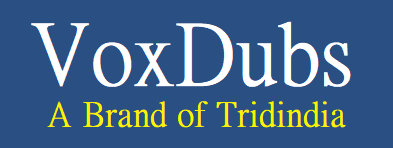Dubbing has become an essential aspect of the entertainment industry, allowing content creators to reach a broader international audience and break language barriers.
Whether it’s movies, TV shows, video games, or educational content, dubbing enables viewers to enjoy the content in their native language, providing a more immersive experience.
However, one critical aspect that content creators and businesses need to consider is the dubbing cost. Understanding the factors that influence dubbing expenses and how to determine the right budget for your dubbing project is vital to ensure a successful and cost-effective endeavor.
In this blog, we will explore various elements that contribute to the dubbing cost and provide insights into making informed budget decisions.
1. Project Scope:
The scope of your dubbing project plays a significant role in determining the overall cost. Are you dubbing a full-length feature film, a short video clip, a series of episodes, or an entire TV show season?
Larger projects with more content to dub will naturally require a higher budget.
Additionally, the complexity of the project, such as the number of characters, special effects, and technical requirements, can impact the cost.
2. Language and Voice Talent:
The number of languages into which you wish to dub your content will significantly influence the dubbing cost. More languages mean more translation and recording work, as well as additional expenses for hiring voice talent for each language.
Moreover, the availability and expertise of voice actors can also affect the overall cost.
Well-known or experienced voice artists may command higher fees, while lesser-known or emerging talents may be more budget-friendly.
3. Quality and Expertise:
The quality of your dubbing can make a significant difference in how your content is perceived by the audience.
High-quality dubbing requires skilled linguists and experienced dubbing partners who understand the nuances of both the source and target languages.
Choosing reputable dubbing professionals or studios may come with a higher price tag, but it ensures a polished and professional final product that resonates with viewers.
4. Script and Translation Services:
Accurate and culturally sensitive translations are crucial for successful dubbing.
The cost of translation services can vary based on the languages involved, the complexity of the content, and the expertise of the translators.
Investing in professional translation services is essential to maintain the integrity of the original content and effectively convey the message to the target audience.
5. Studio and Equipment:
Dubbing requires specialized recording studios and equipment to achieve high-quality audio output.
The cost of studio rentals and equipment usage can vary depending on the location and duration of the dubbing sessions.
Advanced studios with state-of-the-art equipment may come at a higher cost but can significantly impact the overall audio quality.
6. Post-Production and Editing:
After the recording phase, post-production and editing are critical to refining the dubbed content.
Skilled audio engineers work on synchronizing the dubbed audio with the on-screen visuals, ensuring lip-sync accuracy and seamless integration.
This process adds to the dubbing cost, but it is essential for a polished and professional final product.
7. Rights and Licensing:
If your content involves copyrighted material, you may need to acquire dubbing rights and licenses. The cost of obtaining these rights can vary based on the popularity and exclusivity of the content.
8. Timeframe and Turnaround:
Urgent dubbing projects or tight deadlines may require additional resources, leading to higher costs. Proper planning and flexibility with the timeline can help manage expenses more effectively.
Determining the Right Budget:
While dubbing costs can vary based on the factors mentioned above, there are some essential steps to determine the right budget for your dubbing project:
1. Define Your Goals:
Clearly outline your project’s objectives and target audience. Understanding your target market’s preferences and language requirements will guide your decision-making process.
2. Research and Get Quotes:
Conduct thorough research to find reputable dubbing studios or professionals. Request quotes from multiple providers to compare prices and services offered.
3. Quality vs. Budget:
Consider the balance between quality and budget. While cost-saving measures are essential, compromising on the quality of dubbing may impact your content’s overall reception.
4. Scope Flexibility:
Be open to adjusting the scope of your dubbing project if necessary. For instance, if your budget is limited, consider dubbing content in stages or prioritizing key markets.
5. Plan for Future Needs:
If you anticipate more dubbing projects in the future, consider forming a long-term partnership with a reliable dubbing partner. This can lead to cost savings through bulk services or preferred rates.
Conclusion:
Dubbing is a powerful tool to expand your content’s reach and connect with a diverse global audience. However, understanding the various factors that influence dubbing cost is crucial for making informed budget decisions.
By defining your project goals, researching potential providers, and striking a balance between quality and budget, you can ensure a successful dubbing project that enhances the appeal and accessibility of your content worldwide.
Remember that investing in high-quality dubbing can yield long-term benefits and strengthen your brand’s international presence.
For more information contact VoxDubs at +91-8527599201 or grab an instant quote.
